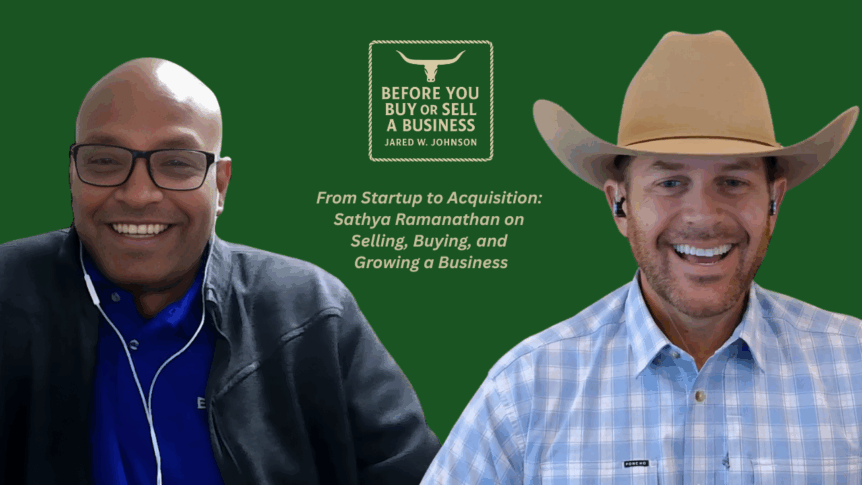Before You Buy or Sell a Business Podcast – Hosted by Jared Johnson
What is the difference between starting a business from scratch and buying an existing one? In Episode 51 of the Before You Buy or Sell a Business podcast, host Jared W. Johnson sits down with Sathya Ramanathan, a former tech founder who grew and exited a software company before acquiring a light construction equipment dealership in Dallas-Fort Worth.
Sathya shares lessons learned from building and selling his first company, navigating a two-year transition with new management, and then stepping into acquisition entrepreneurship. He explains why buying an established company can sometimes be less risky than starting one from the ground up, the due diligence process he followed, and how he evaluates deals for long-term success.
From Startup Exit to Acquisition
Sathya began his career as a founder, scaling a software company and eventually selling it. His experience working with new management during the transition taught him the importance of strong relationships between sellers and buyers. That foundation made his next step into acquisitions a natural one.
He describes how acquisition allowed him to bypass the most difficult startup hurdles. Instead of creating a business from nothing, he was able to purchase a company with existing operations, revenue, and customers. However, Sathya emphasizes that this does not remove all risk. Success still requires clear due diligence, careful evaluation of fit, and disciplined financial planning.
Why Buying Can Be Less Risky Than Starting
According to Sathya, acquiring a company can provide a faster and more stable entry into entrepreneurship compared to starting a business. Established businesses have proven demand, customer relationships, and infrastructure in place. This stability can reduce certain risks, though it also brings its own challenges.
Sathya warns buyers not to underestimate the importance of fit. Matching your skills with the company’s needs is crucial. For example, operational experience, customer relationship management, or digital transformation skills can add immediate value to the right business. Without alignment, even a strong company may not thrive under new ownership.
Key Due Diligence Insights
Sathya outlines several diligence items he believes every buyer should evaluate:
- Working Capital: Ensure the business has sufficient operating funds post-close to avoid liquidity problems.
- Customer Concentration: Review how much revenue comes from a small number of clients and the risk that creates.
- Recurring Revenue: Businesses with recurring or repeatable revenue streams often provide more predictable growth.
- Location and Sector Fit: Define geography and industry preferences before launching a search to stay focused.
He also highlights the importance of flexibility when negotiating. Whether evaluating an asset sale versus a stock sale, setting working capital targets in the LOI, or negotiating terms with brokers, buyers who remain open often find better opportunities.
Building Relationships That Drive Success
Beyond the financials, Sathya stresses that vendor, customer, and employee relationships determine how smooth the transition will be. Trust is built before and after closing by showing respect for existing processes and avoiding rushed changes.
He cautions new buyers not to immediately implement major operational shifts. Instead, patience and observation allow the new owner to understand the business before making improvements. This approach builds credibility with employees and reduces disruption with customers and vendors.
Growth and Expansion Plans
Since taking over his dealership, Sathya has focused on long-term growth. His plans include digital transformation, improved marketing strategies, and evaluating potential expansion opportunities. By balancing patience with a forward-looking vision, he is laying the groundwork for sustainable growth.
Who Should and Should Not Buy a Business
Sathya closes the conversation with candid advice on what type of person should step into ownership. The right buyer is someone with relevant skills, sufficient capital, and the patience to build trust with stakeholders. Those who expect immediate results, underestimate risk, or lack alignment with the business’s needs may struggle.
Key Takeaways from the Episode
- Buying a business can reduce risk compared to starting from scratch but still requires careful planning
- Skills and fit matter as much as financials when evaluating an acquisition
- Strong relationships with sellers, vendors, employees, and customers smooth the transition
- Due diligence should prioritize working capital, customer concentration, and recurring revenue
- Patience and observation before making changes build long-term credibility
Why This Conversation Matters
With more entrepreneurs exploring Entrepreneurship Through Acquisition (ETA) and SBA financing, Sathya’s story provides a real-world example of transitioning from startup founder to acquisition operator. His experience demonstrates that acquisitions are not only about financial metrics but also about cultural fit, stakeholder relationships, and strategic growth.
For anyone considering buying a business, this episode delivers practical lessons that can help avoid missteps and set up future success.
Listen to the Full Episode
You can stream Episode 51, From Startup to Acquisition: Sathya Ramanathan on Selling, Buying, and Growing a Business, on the Before You Buy or Sell a Business podcast or wherever you listen to podcasts.
For more insights on business acquisitions, deal structures, and ETA strategy, visit Jared W. Johnson’s website.

